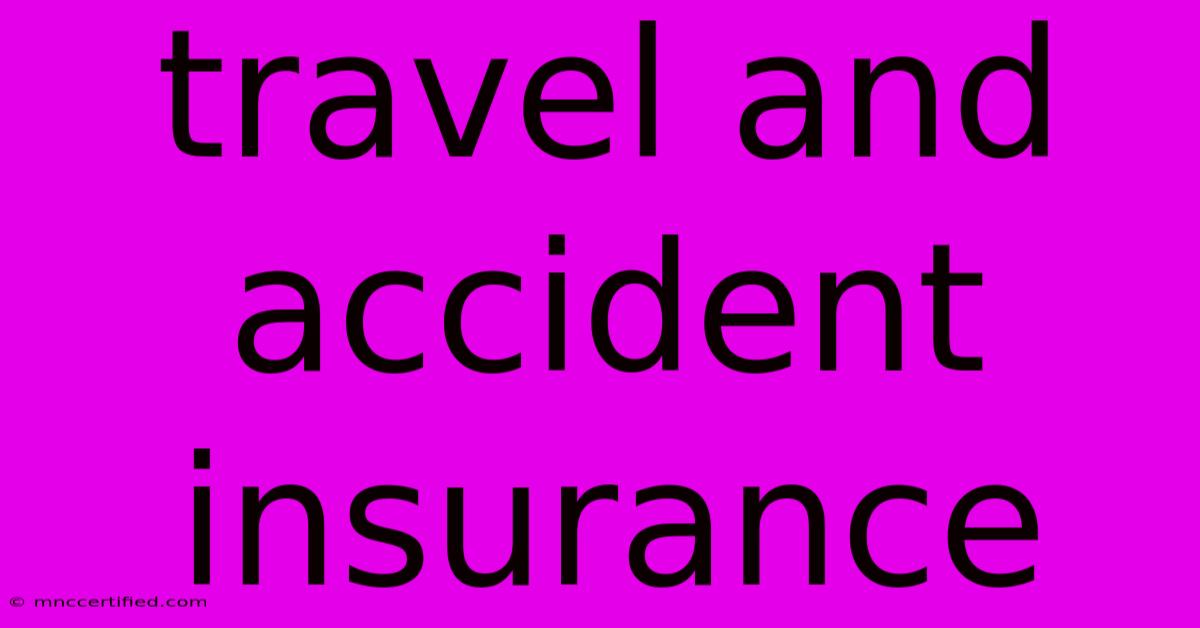Travel And Accident Insurance

Table of Contents
Travel and Accident Insurance: Your Shield Against the Unexpected
Planning a trip is exciting, filled with dreams of adventure and exploration. But what happens when the unexpected occurs? A sudden illness, a lost passport, a delayed flight – these unforeseen events can quickly turn a dream vacation into a financial nightmare. That's where travel and accident insurance steps in, providing a crucial safety net for your journey. This comprehensive guide will delve into the importance of travel insurance, the different types available, and how to choose the right policy for your needs.
Why is Travel Insurance Essential?
Many underestimate the importance of travel insurance, viewing it as an unnecessary expense. However, the potential costs associated with medical emergencies, trip cancellations, or lost belongings abroad can far outweigh the premium of a comprehensive policy. Consider these scenarios:
- Medical emergencies: A simple fall can result in hefty medical bills, especially in countries with expensive healthcare systems. Travel insurance can cover emergency medical treatment, hospitalization, and even medical evacuation.
- Trip cancellations or interruptions: Unexpected events like severe weather, family emergencies, or job loss can force you to cancel or cut short your trip. Travel insurance can reimburse you for non-refundable expenses, such as flights and accommodations.
- Lost or stolen belongings: Losing your luggage or having valuables stolen can be devastating. Insurance can compensate you for the value of your lost items.
- Delayed or missed flights: Flight delays and cancellations are unfortunately common. Travel insurance can cover expenses incurred due to these disruptions, such as accommodation and meals.
- Emergency repatriation: In the event of a serious illness or accident, travel insurance can cover the cost of transporting you back to your home country for treatment.
Types of Travel Insurance
Travel insurance policies vary widely, offering different levels of coverage. Understanding the various types will help you choose the right policy for your trip:
- Standard Travel Insurance: This typically covers basic necessities like medical emergencies, trip cancellations, and lost luggage. It's a good option for shorter trips and those with fewer concerns.
- Comprehensive Travel Insurance: Offers broader coverage, including things like adventure sports activities, pre-existing conditions (with limitations), and higher coverage limits for medical expenses. This is ideal for longer trips, adventurous travelers, or those with pre-existing health conditions.
- Backpacker Insurance: Specifically designed for budget travelers, often including coverage for activities like hiking and backpacking, with a focus on affordability.
- Luxury Travel Insurance: Caters to high-net-worth individuals, providing higher coverage limits and more comprehensive benefits, such as concierge services and emergency assistance.
- Cruise Insurance: Specifically tailored to cruise vacations, covering cruise-related cancellations, medical emergencies onboard, and lost luggage.
Understanding Policy Exclusions
It's vital to carefully review your policy's terms and conditions, paying close attention to exclusions. Common exclusions may include:
- Pre-existing medical conditions: Many policies exclude coverage for pre-existing conditions unless specifically declared and covered with an additional premium.
- Adventure sports: Some policies may exclude or limit coverage for certain high-risk activities.
- Acts of war or terrorism: These events are often excluded from standard policies.
Choosing the Right Travel Insurance Policy
Selecting the right travel insurance policy requires careful consideration of your individual needs and the specifics of your trip. Consider these factors:
- Destination: The cost of medical care varies significantly between countries. Travel to remote or high-risk areas may require more comprehensive coverage.
- Trip duration: Longer trips generally require more extensive coverage.
- Activities planned: If you plan to engage in adventure sports or other high-risk activities, ensure your policy includes coverage for these.
- Pre-existing medical conditions: If you have pre-existing conditions, disclose them honestly to the insurer and inquire about potential coverage options.
- Budget: Compare policies from different providers to find one that fits your budget while offering adequate coverage.
Off-Page SEO Considerations: Building Authority
To improve the search engine ranking of this article, consider the following off-page SEO strategies:
- Guest blogging: Write guest posts on relevant travel blogs and websites, linking back to this article.
- Social media marketing: Share the article on relevant social media platforms, engaging with users and encouraging shares.
- Link building: Seek backlinks from reputable travel-related websites and forums.
- Directory submissions: Submit the article to relevant online directories.
By understanding the nuances of travel and accident insurance and implementing both on-page and off-page SEO strategies, you can create a valuable resource that ranks well in search engine results and helps potential travelers make informed decisions about protecting their trips. Remember, investing in travel insurance is investing in peace of mind.

Thank you for visiting our website wich cover about Travel And Accident Insurance. We hope the information provided has been useful to you. Feel free to contact us if you have any questions or need further assistance. See you next time and dont miss to bookmark.
Featured Posts
-
Rooney Digs At Plymouth
Nov 28, 2024
-
Grounding And Bonding Diagram
Nov 28, 2024
-
International Trading Card Day
Nov 28, 2024
-
Physical Therapy No Insurance
Nov 28, 2024
-
Kamran Ghulam Hits First Odi Century
Nov 28, 2024